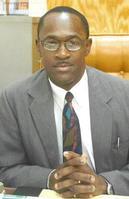
LIVINGSTONE THOMPSON, Guest ColumnistP.W. Botha, former president of the apartheid regime in South Africa, died recently but not many people are grieving for him. Since his name became synonymous with injustice, denial of human rights and all the extremes of racism, it is not surprising that his passing has not overwhelmed the international community with a feeling of grief and loss. Botha's commitment to injustice and the exclusion of blacks from the political process was one of the inspirations for organisations, like the World Council of Churches (WCC), to develop their programmes to combat racism. With the help of the international community, South Africans, inspired by people like Nelson Mandela, slew the apartheid beast, even though its children, segregation and violence, and its parents, injustice and inequality, are still alive and well. No one is singing Botha's praises, but many would be ready to write his epithet: Those who use their power to serve the cause of injustice, state violence and racism will have their day with death and no one will grieve for it.
APPROPRIATE ACTION
The decade of the 1980s saw apartheid making its most violent kick, after the determination and single-mindedness of the martyrs of the struggle struck the beast with a fatal blow. The ferocity of apartheid in its dying moments led to an unprecedented number of people being killed by the state as one black township after another revolted against its oppression. The scenes we see coming out of Iraq on a daily basis now are reminiscent of the scenes from South Africa. The revolt of the oppressed peoples was described as senseless violence and many of us, from the security of our homes far away, became involved in theoretical discussions about the merit of violence and armed revolt. The financial support of the WCC for the organisations like the African National Congress, (ANC) and the South West Africa People's Organisation (SWAPO), led to a withdrwal of member churches from the council, protesting that the WCC was supporting violence. This is the first lesson from South Africa: When the state uses its army and the police to violently suppress the wishes and rights of the people, violence may be the only appropriate action against the power of the state.
It was in the midst of the growing uncertainty about what actions may be appropriate in response to state-led terror that a group of theologians produced the Kairos Document, which was a theological comment on the political crisis. In the thinking of the authors, it was a kairos, meaning a moment of truth, for apartheid as well as for the churches. One of the ways in which the statement was significant was that it showed leaders stepping back from their situation and making a critical analysis of the situation and the ways their fellow Christians were thinking about it. The authors of the Kairos Document faced the difficulty of having to say to their fellows that their approach to faith and spirituality in which they moralise, about peace, individual conversion, and non-violence was not helping the cry of the masses. They called instead for a proper social analysis to understand the causes of apartheid and the development of a proper political strategy to change the structures of the society. They questioned the attitude in which Christians were sitting and praying for God's intervention but had no vision of the strategy they would engage to move the society out of apathy and paralysis. In so doing, they were bold in exposing the counter-productive nature of the programmes and campaigns that some churches were mounting.
This is the second lesson from South Africa: Where the society is faced with a crisis, Christian moralising will be of little help. Instead, the churches must avail themselves of proper social analysis and clarify the political strategy they will support for radical change. Those church leaders who wax warm about not becoming involved in politics and that the Christian faith is not about political actions, are fooling themselves. As the Kairos Document was keen to show, the failure to develop appropriate political action will only result in Christians being co-opted into causes that aid and abet injustice.
REGIME CREDIBILITY
The fundamental issue that apartheid represented was how a regime lost its credibility. For that reason the Kairos theologians believed any cooperation with that tyrannical regime was inappropriate. Although that regime has been relegated to the scrap heap of history, its basic moral character remains an issue for nation-states, including our own. It may be easy to see the waning credibility in governments like the Bush and Blair administrations, as they make countless efforts to justify the perpetration of injustice in Iraq. It may not be as easy to see the threat when political parties, as we have in Jamaica, bring their credibility into question by the way in which they receive and use money and the characters with whom they consort. It may be even more difficult for churches to see that their credibility is called into question by silence, their failure to do appropriate social analysis and their ineptitude in taking no appropriate political action. This, too, is a lesson from South Africa: Regimes do irreparable damage to their credibility when they persist in justifying their wrong.
Dr. Livingstone Thompson is a Jamaican theologian living and working in the Republic of Ireland. He may be contacted via e-mail at livingstone.thompson@oceanfree.net.

